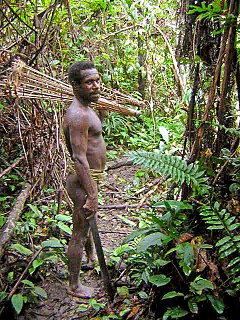
Egalitarianism, or equalitarianism, is a school of thought that prioritizes equality for all people. Egalitarian doctrines maintain that all humans either should "get the same, or be treated the same" in some respect such as social status. Egalitarianism is a trend of thought in political philosophy. According to the Merriam-Webster Dictionary, the term has two distinct definitions in modern English, namely either as a political doctrine that all people should be treated as equals and have the same political, economic, social and civil rights, or as a social philosophy advocating the removal of economic inequalities among people, economic egalitarianism, or the decentralization of power. Some sources define egalitarianism as the point of view that equality reflects the natural state of humanity.

Human rights are "the basic rights and freedoms to which all humans are entitled" Examples of rights and freedoms which are often thought of as human rights include civil and political rights, such as the right to life, liberty, and property, freedom of expression, pursuit of happiness and equality before the law; and social, cultural and economic rights, including the right to participate in science and culture, the right to work, and the right to education.
All human beings are born free and equal in dignity and rights. They are endowed with reason and conscience and should act towards one another in a spirit of brotherhood.

In moral and political philosophy, the social contract is a theory or model that originated during the Age of Enlightenment and usually concerns the legitimacy of the authority of the state over the individual. Social contract arguments typically posit that individuals have consented, either explicitly or tacitly, to surrender some of their freedoms and submit to the authority in exchange for protection of their remaining rights or maintenance of the social order. The relation between natural and legal rights is often a topic of social contract theory. The term takes its name from The Social Contract, a 1762 book by Jean-Jacques Rousseau that discussed this concept. Although the antecedents of social contract theory are found in antiquity, in Greek and Stoic philosophy and Roman and Canon Law, the heyday of the social contract was the mid-17th to early 19th centuries, when it emerged as the leading doctrine of political legitimacy.
In anthropology, a tribe is a human social group. Exact definitions of what constitutes a tribe vary among anthropologists. The concept is often contrasted with other social groups concepts, such as nations, states, and forms of kinship.
Human capital is the stock of knowledge, habits, social and personality attributes, including creativity, embodied in the ability to perform labor so as to produce economic value. Human capital theory is closely associated with the study of human resources management as found in the practice of business administration and macroeconomics. The original idea of human capital can be traced back at least to Adam Smith in the 18th century. The modern theory was popularized by Gary Becker, an economist and Nobel Laureate from the University of Chicago, Jacob Mincer, and Theodore Schultz. As a result of his conceptualization and modeling work using Human Capital as a key factor, the Nobel Prize for Economics, 2018, was awarded (jointly) to Paul Romer who founded the modern innovation-driven approach to understanding economic growth.
Social justice is a concept of fair and just relations between the individual and society. This is measured by the explicit and tacit terms for the distribution of wealth, opportunities for personal activity, and social privileges. In Western as well as in older Asian cultures, the concept of social justice has often referred to the process of ensuring that individuals fulfill their societal roles and receive what was their due from society. In the current global grassroots movements for social justice, the emphasis has been on the breaking of barriers for social mobility, the creation of safety nets and economic justice.

A developing country is a country with a less developed industrial base and a low Human Development Index (HDI) relative to other countries. However, this definition is not universally agreed upon. There is also no clear agreement on which countries fit this category. A nation's GDP per capita compared with other nations can also be a reference point.

An ethnic group or an ethnicity, is a category of people who identify with each other based on similarities such as common ancestry, language, history, society, culture or nation. Ethnicity is usually an inherited status based on the society in which one lives. Membership of an ethnic group tends to be defined by a shared cultural heritage, ancestry, origin myth, history, homeland, language or dialect, symbolic systems such as religion, mythology and ritual, cuisine, dressing style, art or physical appearance.
Economic development is the process by which a nation improves the economic, political, and social well-being of its people. The term has been used frequently by economists, politicians, and others in the 20th and 21st centuries. The concept, however, has been in existence in the West for centuries. "Modernization, "westernization", and especially "industrialization" are other terms often used while discussing economic development. Economic development has a direct relationship with the environment and environmental issues. Economic development is very often confused with industrial development, even in some academic sources.

Conflict theories are perspectives in sociology and social psychology that emphasize a materialist interpretation of history, dialectical method of analysis, a critical stance toward existing social arrangements, and political program of revolution or, at least, reform. Conflict theories draw attention to power differentials, such as class conflict, and generally contrast historically dominant ideologies. It is therefore a macro-level analysis of society.

Living organisms including humans are social when they live collectively in interacting populations, whether they are aware of it, and whether the interaction is voluntary or involuntary.
The division of human rights into three generations was initially proposed in 1979 by the Czech jurist Karel Vasak at the International Institute of Human Rights in Strasbourg. He used the term at least as early as November 1977. Vasak's theories have primarily taken root in European law.

International development or global development is a broad concept denoting the idea that societies and countries have differing levels of 'development' on an international scale. It is the basis for international classifications such as developed country, developing country and least developed country, and for a field of practice and research that in various ways engages with international development processes. There are, however, many schools of thought and conventions regarding which are the exact features constituting the 'development' of a country.
Formerly known as the World Commission on Environment and Development (WCED), the mission of the Brundtland Commission is to unite countries to pursue sustainable development together. The Chairperson of the Commission, Gro Harlem Brundtland, was appointed by United Nations Secretary-General Javier Pérez de Cuéllar in December 1983. At the time, the UN General Assembly realized that there was a heavy deterioration of the human environment and natural resources. To rally countries to work and pursue sustainable development together, the UN decided to establish the Brundtland Commission. Gro Harlem Brundtland was the former Prime Minister of Norway and was chosen due to her strong background in the sciences and public health. The Brundtland Commission officially dissolved in December 1987 after releasing Our Common Future, also known as the Brundtland Report, in October 1987. The document popularized the term "Sustainable Development". Our Common Future won the University of Louisville Grawemeyer Award in 1991. The organization Center for Our Common Future was started in April 1988 to take the place of the Commission.

Development theory is a collection of theories about how desirable change in society is best achieved. Such theories draw on a variety of social science disciplines and approaches. In this article, multiple theories are discussed, as are recent developments with regard to these theories. Depending on which theory that is being looked at, there are different explanations to the process of development and their inequalities
Postdevelopment theory holds that the whole concept and practice of development is a reflection of Western-Northern hegemony over the rest of the world. Postdevelopment thought arose in the 1980s out of criticisms voiced against development projects and development theory, which justified them.

Culture is the social behavior and norms found in human societies. Culture is considered a central concept in anthropology, encompassing the range of phenomena that are transmitted through social learning in human societies. Cultural universals are found in all human societies; these include expressive forms like art, music, dance, ritual, religion, and technologies like tool usage, cooking, shelter, and clothing. The concept of material culture covers the physical expressions of culture, such as technology, architecture and art, whereas the immaterial aspects of culture such as principles of social organization, mythology, philosophy, literature, and science comprise the intangible cultural heritage of a society.
Paul James, is Professor of Globalization and Cultural Diversity at Western Sydney University, and Director of the Institute for Culture and Society where he has been since 2014. He is a writer on global politics, globalization, sustainability, and social theory.

Although related subjects, sustainable development and sustainability are different concepts. Weak sustainability is an idea within environmental economics which states that 'human capital' can substitute 'natural capital'. It is based upon the work of Nobel Laureate Robert Solow and John Hartwick,. Contrary to weak sustainability, strong sustainability assumes that "human capital" and "natural capital" are complementary, but not interchangeable.













